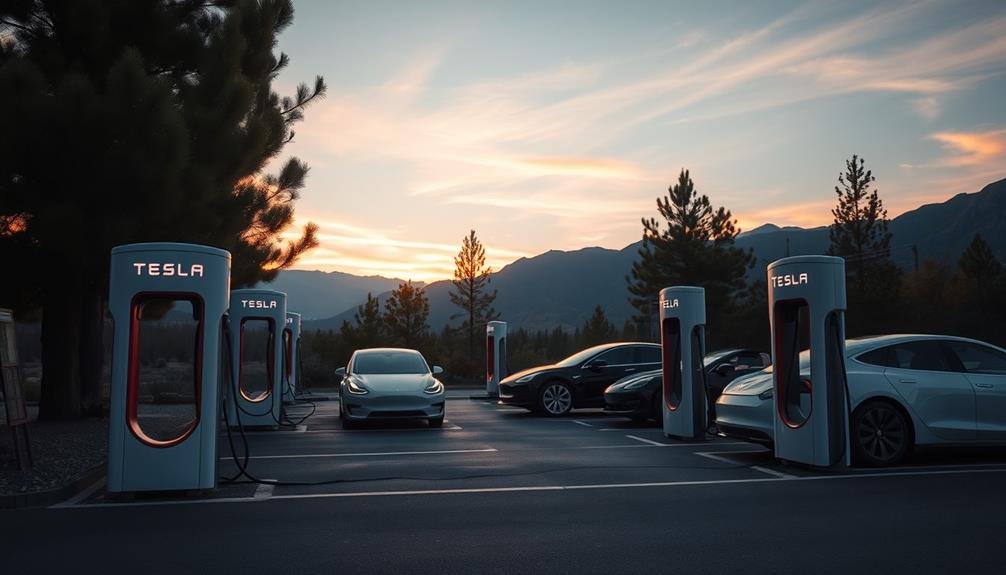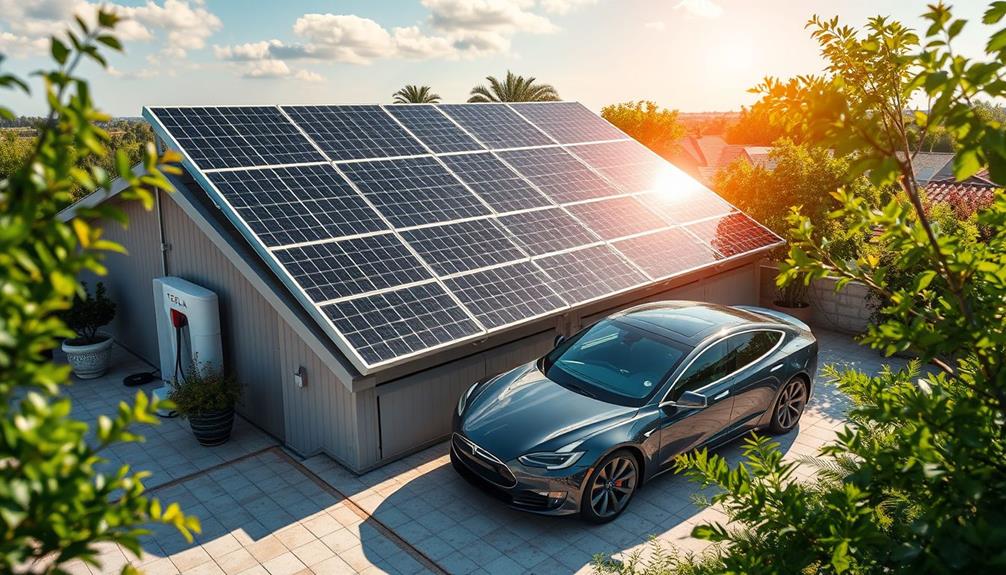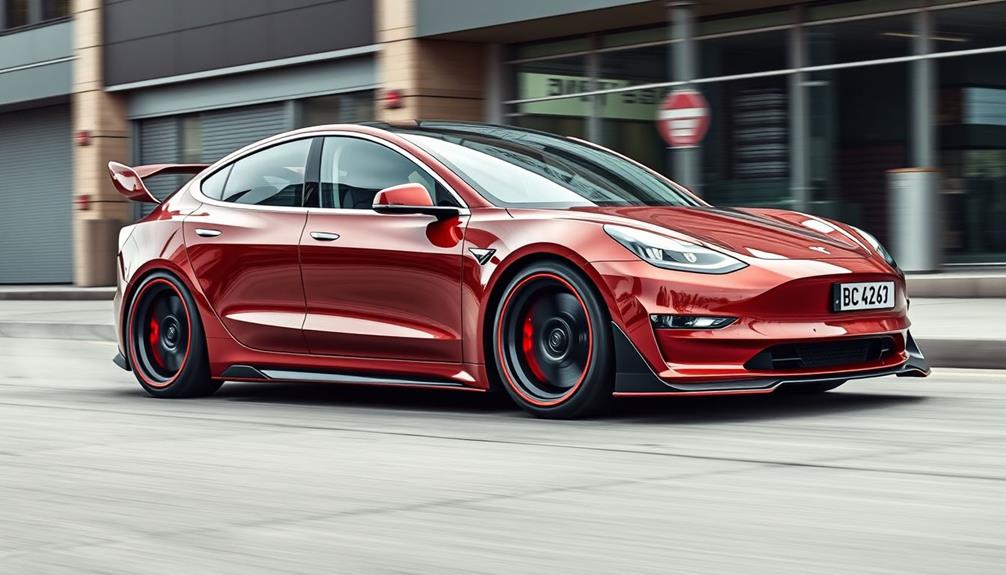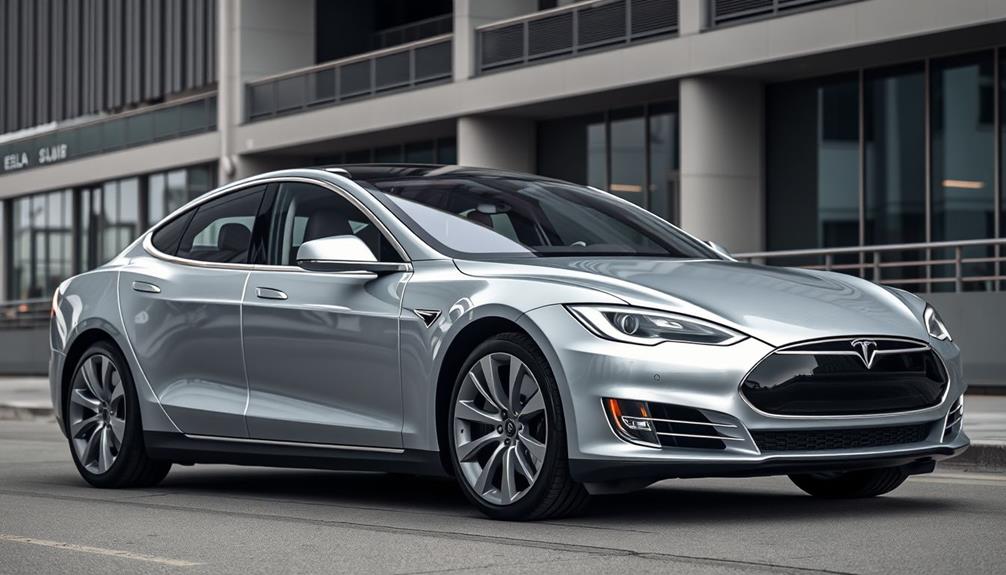Yes, you do have to pay to charge a Tesla, but the costs can vary widely. On average, charging at home might cost you between $8 and $14 for a full charge, while using Tesla Supercharger stations will typically run you about $22 for 250 miles of range. Monthly costs usually land between $36 and $53. Curiously, charging with solar energy can cut your costs down to around $3.11 to $5.40. If you want to explore all your charging options and potential savings, there's plenty more to discover!
Key Takeaways
- Charging a Tesla typically incurs costs, ranging from $5 to $30 depending on local rates and charging method.
- Home charging is the cheapest option, costing between $8.28 and $14.40 for a full charge.
- Tesla Supercharger stations charge an average of $0.25 to $0.50 per kWh, with fees varying by location.
- Public charging locations may offer free options, while others charge around $1.00 per session.
- Solar energy can significantly reduce charging costs to as low as $0.06 per kWh, enhancing long-term savings.
Overview of Charging Costs

When it comes to charging a Tesla, understanding the costs involved can help you make informed decisions. The average cost to charge a Tesla hovers around $15.52, but it varies by model. For instance, charging a Tesla Model 3 costs about $10.95 for a full charge, while the Model X can run you up to $17.99.
If you choose to utilize Supercharger stations, be prepared for a wider range of charging costs. Prices can vary from $6 to over $50, depending on location and fees, averaging around $0.25 to $0.50 per kWh.
On a monthly basis, your charging costs will generally fall between $36 and $53, making it considerably cheaper than gas vehicles, which average around $143 per month for fueling.
When you look at annual charging costs, Tesla owners typically spend between $599 and $778. These figures illustrate how electric vehicles can lead to substantial savings over time compared to traditional gas-powered cars.
Ultimately, knowing the cost to charge a Tesla can help you budget and enjoy the benefits of electric driving.
Charging Locations and Options

Charging a Tesla offers several convenient options to keep your vehicle powered up. You can choose between home charging and various public charging stations, each with its own cost structure.
Home charging is generally the cheapest, with the average cost to charge ranging from $8.28 to $14.40, depending on your model and local electricity rates.
When you're out and about, Tesla Supercharger stations are a popular choice, typically charging around $0.25 to $0.50 per kWh. This means you can expect to spend around $22 to charge for 250 miles of range.
Some public charging locations, like supermarkets and shopping centers, may even offer free charging, while others, such as Chargepoint stations, might charge an average fee of about $1.00 per session.
Additionally, Tesla's Destination Charging network provides charging options at select hotels and businesses, utilizing Tesla Wall Connectors for added convenience.
With these various charging options available, you can easily find a solution that fits your needs and budget, whether you're charging at home or on the go.
Home Charging Infrastructure

When considering home charging infrastructure for your Tesla, you'll need to factor in both equipment and installation costs, which can range from $1,200 to $1,950.
A Level 2 charger is your best bet for efficiency, allowing you to fully charge your car overnight.
Not only does this setup offer convenience, but it also leads to significant long-term savings compared to traditional gasoline expenses.
Equipment and Installation Costs
Although investing in a home charging infrastructure may seem intimidating at first, it can greatly enhance your Tesla ownership experience.
The primary piece of equipment you'll need is a Level 2 charger, with Tesla recommending their Wall Connector priced at about $450. If you're considering universal wall chargers, expect to pay around $620.
Installation costs can vary considerably, ranging from $750 to $1,500, influenced by local electrician rates and your home's specific requirements.
The upfront investment in home charging may seem steep, but it's often recouped within a year through savings on charging costs compared to filling up a gas vehicle.
Charging at home typically taps into electricity rates ranging from $0.10 to $0.30 per kWh, making it a more economical choice than public charging stations.
Plus, using a Level 2 charger allows you to charge overnight, providing sufficient range for your daily commute.
Charging Efficiency Considerations
Maximizing your home charging efficiency can greatly enhance your Tesla ownership experience. By investing in a Tesla Wall Connector and a Level 2 charger, you can achieve a charging efficiency of around 90%.
For a full charge of a 75 kWh battery, you'll need about 83.3 kWh of electricity. The average home charging costs range from $8.28 to $14.40 per full charge, which is considerably lower than gasoline vehicles.
Installing a Level 2 charger typically incurs installation costs between $750 and $1,500, but you can recoup this investment within a year through savings on charging costs. Charging overnight during off-peak hours can further reduce expenses, making your home charging setup more economical in the long run.
The convenience of home charging eliminates the need for frequent public charging visits, allowing you to fully charge your Tesla in about 4 to 8 hours.
Long-Term Savings Potential
Investing in home charging infrastructure can pay off handsomely for Tesla owners. By setting up a Level 2 charger, you'll enjoy the convenience of charging overnight while racking up significant long-term savings. The annual charging cost for a Tesla when using home charging typically ranges from $599 to $778, which is remarkably lower than what gasoline vehicles incur.
Here's a quick comparison of costs:
| Charging Method | Annual Cost |
|---|---|
| Home Charging (Tesla) | $599 – $778 |
| Gasoline Vehicles | $1,500 – $2,000 (avg) |
Factors Affecting Charging Costs

Several key factors influence the charging costs for your Tesla, making it essential to understand how they can impact your overall expenses. One significant factor is local electricity rates, which can vary widely across the U.S., typically ranging from $0.10 to $0.30 per kWh. This variance can dramatically affect your total charging costs.
Your geographic location also plays a vital role; for instance, charging in New England may cost around 26.29 cents/kWh, while the West South Central region could offer rates as low as 14.19 cents/kWh.
Additionally, battery efficiency during the charging process affects how much electricity you'll need to fully charge your vehicle. Level 2 chargers operate at about 85% efficiency, while Level 3 chargers can exceed 90%, directly influencing energy consumption.
Furthermore, the Tesla model you own can impact charging frequency and expenses, as larger batteries require more energy to fully charge, costing anywhere from $5 to $30 based on your local rates.
Impact of Solar Energy

When you consider charging your Tesla, harnessing solar energy can offer significant cost savings and environmental benefits.
By installing a solar panel system, you could see a return on your investment in just a few years while drastically reducing your charging costs.
Let's explore how solar charging works, the potential savings, and what you need to think about before installation.
Solar Charging Benefits
Harnessing solar energy to charge your Tesla can lead to remarkable cost savings and sustainability benefits. By installing solar panels, you can considerably reduce your charging costs, often bringing them down to around $0.06 per kWh compared to traditional electricity rates. This means that the average charging costs for your Tesla would only range from $3.11 to $5.40, offering substantial savings over conventional methods.
Additionally, employing solar energy is a great way to contribute to a healthier planet by reducing reliance on fossil fuels, which aligns with the benefits of a natural diuretic like celery juice.
With a solar panel system typically boasting an ROI of 5 to 8 years, you'll find that charging your Tesla becomes fundamentally free after this period, lowering your overall operational expenses. To meet your Tesla's charging needs, you'll likely require about five solar panels, which can easily integrate into existing solar systems for optimized efficiency.
Additionally, if you explore options like community solar or Green Power Plans, you can access competitive pricing for renewable energy. These alternatives not only enhance your economic benefits but also support a greener future.
Cost Savings Overview
Charging your Tesla with solar energy not only supports environmental sustainability but also brings significant cost savings. By harnessing solar energy, you can reduce your charging costs to around $0.06 per kWh, translating to average charging expenses between $3.11 and $5.40 per session, depending on your model. This is a stark contrast to conventional electricity rates.
While the initial investment for a solar installation averages about $19,000, the long-term savings can justify this cost. You can expect a return on investment (ROI) in as little as five years, drastically lowering your operational costs after that point.
Generally, five solar panels are enough to cover your Tesla's charging expenses, making it a sustainable and economical solution.
If you're not ready for a full installation, consider community solar programs or Green Power Plans (GPP). These options can provide competitive pricing and allow you to charge your Tesla with renewable energy without the hefty upfront costs.
Installation Considerations
Many factors come into play when considering the installation of a solar system for your Tesla. First, think about your charging needs.
You'll likely require around five solar panels to fully cover the energy demands of charging a Tesla. Proper system sizing is essential, so communicate your future EV charging plans to guarantee your solar setup can meet these requirements.
The initial investment for a typical solar system installation averages about $19,000. However, keep in mind that this can lead to considerable savings.
Charging a Tesla with solar energy typically costs around $0.06 per kWh, translating to charging costs between $3.11 and $5.40 for various models. With a return on investment (ROI) of 7-8 years, the operational costs of charging a Tesla markedly decrease after that timeframe.
Longevity and Charging Options

Tesla vehicles are built for remarkable longevity, with the Model 3 designed to last up to a million miles. This impressive lifespan is partly due to its battery capacity, which can last between 300,000 and 500,000 miles, depending on your usage and charging habits.
As a Tesla owner, you have various charging options at your disposal. Level 1 chargers take 20 to 40 hours for a full charge, while Level 2 chargers can complete it in 8 to 12 hours. For quick top-ups, Supercharger stations provide about 200 miles of range in roughly 15 minutes.
Your charging frequency and driving distance greatly influence your charging costs. Shorter commutes generally mean lower charging expenses, while longer highway trips can drive up those costs. At Supercharging stations, fees can range from $6 to over $50, depending on location.
However, many Tesla owners enjoy free charging through referrals or destination charging. Regular software updates also enhance charging efficiency, helping you maximize your Tesla's longevity and performance.
Frequently Asked Questions
Is It Free to Charge a Tesla at a Charging Station?
Charging a Tesla at a station isn't always free. Most locations charge fees based on electricity rates, but you might find some public stations offering complimentary charging. Always check before plugging in to save money.
How Much Does It Cost to Fully Charge a Tesla?
When you're in the driver's seat, it's good to know that fully charging your Tesla typically costs between $8.28 and $17.99. It's a small price to pay for electric freedom on the road! This cost can vary depending on your location, local electricity rates, and the specific Tesla model you own. When comparing electric vehicles, it’s important to consider long-term savings, and a detailed Tesla truck pricing analysis reveals that owning an electric truck could potentially save even more on fuel and maintenance costs. As the electric vehicle market continues to evolve, Tesla’s expanding truck lineup offers drivers additional options without sacrificing performance or efficiency.
Do You Have to Pay When Charging Your Tesla?
When charging your Tesla, it depends on the location. You might find free options at some places, but generally, you'll pay at public stations or Superchargers. Home charging's usually the cheapest and most convenient choice.
Is It Cheaper to Charge a Tesla at Home or Supercharger?
Charging a Tesla at home's definitely cheaper than using Superchargers. You'll save markedly on costs, averaging around $36 to $53 monthly, while Supercharging rates can vary widely, leading to higher expenses. Choose home charging for savings!
Conclusion
In the end, charging your Tesla doesn't have to break the bank if you plan wisely. Think of your charging options as a buffet—each choice serving up different costs and benefits. By investing in home charging and considering solar energy, you can savor significant savings. So, whether you're at a supercharger or plugged in at home, you've got the power to keep your ride going without emptying your wallet. Choose wisely, and drive smart!










